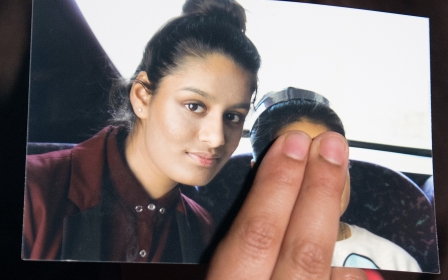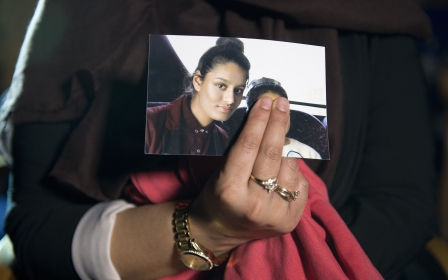Shamima Begum case highlights 'two-tier' British citizenship system, experts warn

British Home Secretary Sajid Javid has set a "dangerous precedent" by revoking the citizenship of Shamima Begum, a teenager who left London in 2015 to travel to Islamic State (IS) group-controlled Syria at the of 15, community groups and legal experts have warned.
Commenting on the British government stripping her citizenship, Begum told ITV News on Wednesday that it was "hard to swallow" and "unjust to her and her son".
Begum, whose child was born on Sunday in the al-Hawl refugee camp to where she fled earlier this month from IS-held territory in northeastern Syria, has previously said that she wants to return to the UK.
Javid notified Begum's parents of his decision to strip their daughter of her citizenship on Tuesday, but the family's solicitor has challenged the move, saying that it leaves the 19-year-old stateless.
Various outlets including the BBC have reported that Javid used Begum's eligibility for Bangladeshi citizenship via her parents as justification for removing her British citizenship.
New MEE newsletter: Jerusalem Dispatch
Sign up to get the latest insights and analysis on Israel-Palestine, alongside Turkey Unpacked and other MEE newsletters
Begum, who was born in Britain, has parents who are of Bangladeshi heritage. According to her family and lawyer, she has never been to Bangladesh and does not hold a Bangladeshi passport.
The UK Home Office did not respond to requests for comment by Middle East Eye. In a previous statement, it said it did not comment on individual cases, but Javid has previously said that he will use all powers available to him to prevent Begum's return to the UK.
The move also appears to contradict an example of policy contained in the British government's own counter-terrorism strategy in which the case of a woman with a newborn baby seeking to travel home to the UK from IS territory is managed so that she is either charged and prosecuted on her return or "assisted in reintegrating into society" if no charges can be brought.
In a foreward to the document, which was published last year, Javid wrote: "We do not live in a surveillance state and nor do we want to. Our response must therefore continue to be proportionate, inclusive and subject to strong oversight."
Two-tier citizenship system
Javid's decision has raised concerns that millions of British citizens who are dual nationals or eligible for citizenship in another country because of their heritage could be exposed to the risk of having their UK citizenship revoked, effectively rendering them second-class citizens alongside British nationals born to parents with no claim to another nationality.
Under the UK nationality act, the government has powers to strip both naturalised British nationals and British-born nationals of their citizenship, but only if the move does not leave them stateless, in contravention of international law.
A spokesperson for the Muslim Council of Britain, the UK's largest representative body for British Muslims, told Middle East Eye that Javid had "amplified fears" that Britain has a "two-tiered citizenship system."
"The decision to strip Ms Begum of her citizenship could send a chill down the spine of not just British Muslim communities, but also all Britons whose parents come from immigrant backgrounds," the spokesperson told MEE.
"[Begum] must be able to face justice and the rule of law, qualities that were sorely missing in the death and destruction of Daesh," an alternative acronym for the IS group.
The MCB's concerns were echoed by the Runnymede Trust, a think tank specialising in race equality, who said that the case served to clarify that anyone who has "dual citizenship is now at risk of losing their citizenship rights".
How racialised is citizenship in Britain?
British-Bangladeshis are automatically eligible for Bangladeshi citizenship if their parents are Bangladeshi nationals, according to Bangladesh's nationality rules. This, however, expires at the age of 21 if someone with entitlement to Bangladeshi nationality has not made an active effort to obtain their Bangladeshi citizenship.
Devyani Prabhat, a law lecturer at the University of Bristol, said that Javid's decision raised questions about whether British citizenship was equal for all.
"The problematic aspect of this case is that if Shamima has Bangladeshi nationality, she likely has this automatically because of her Bangladeshi heritage, and despite being born in the UK," said Prabhat.
"This means there are millions of naturalised and dual nationality holders in the UK today on whom this power to strip can operate without them even being aware they have any other existing nationality.
"And this naturally raises questions about equal British citizenship is? How racialised is it? And why does it seem to depend on other foreign nationality laws whether or not someone remains British?"
Middle East Eye reported on Friday that any attempt to block Begum's return to Britain could be thwarted due to a recent legal ruling that ordered the UK government to restore citizenship to two British nationals suspected of involvement in terrorism.
The Home Office had cited "terrorism-related and national security grounds" in its decision to strip two men of their UK citizenship.
Like Begum, both men are of Bangladeshi origin, and the court ruled that the government's decision had left them stateless.
Middle East Eye delivers independent and unrivalled coverage and analysis of the Middle East, North Africa and beyond. To learn more about republishing this content and the associated fees, please fill out this form. More about MEE can be found here.



